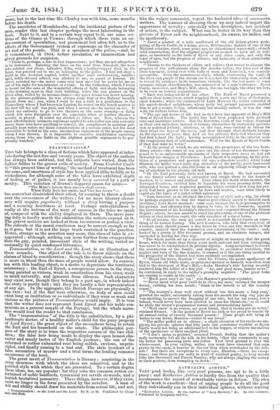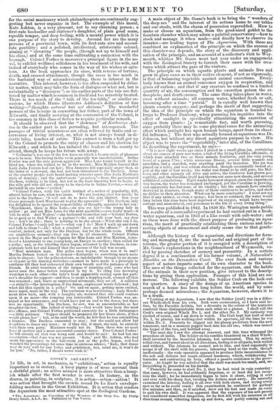KATHARINE ASHTON. * VERY good books, like very good persons, are
apt to be a little prosy ; and Katharine Ashton is hardly free from the quality that accompanies the record of remarkable virtue in fiction. The idea of the work is excellent—that of urging people to do all the good they individually can in their individual spheres, without waiting
• Katharine Ashton. By the Author of "Amy Herbert," Re. In two volumes. Pubhshed by Longman and Co.
for the social machinery which philanthropists are continually sug- gesting but never organize in fact. The example of this moral, Kate Ashton, is a very pleasant, not to say charming person ; a first-rate bookseller and stationer's daughter, of plain good sense, equable temper, and deep feeling, with a mental power which it is one purpose of the story to develop. Around her are the many persons of a provincial town, with its first-rate airs and second- rate gentility; and a polished, intellectual, aristocratic colonel, aiming at " elevating " the people, (though not up to himself and his class,) and at the same time cultivating a connexion with the borough. Colonel Forbes is moreover a principal figure in the no- vel, to exhibit wellbred selfishness in his treatment of his wife, and indeed of everybody who comes in the way of his wishes or opin- ions. As the book approaches its close, with reverse of fortune, death, and crossed attachment, though the cross is too much in the hacknied way of misunderstanding, there is interest in the narrative. This interest, however, is too often suspended by didac- tic matter, which may take the form of dialogue or what not, but is substantially a "discourse "; as the earlier parts of the tale are flat- tened by matter which is common in itself and too minutely treated. There is too much of the " talk of the tea-table," or similar oc- casions, by which Hume illustrates Addison's definition of fine writing—" thoughts natural but not obvious." The wonderful powers of the heroine in converting her father, part of the town of Rilworth, and finally assisting at the conversion of the Colonel, is too common in this class of fiction to require particular remark.
It should be observed that the " slowness" of Katharine Ash- ton in the earlier part is not pervading, but interspersed. The passages of trivial minuteness are often relieved by traits and oc. currences of living interest, or, what is not always found in di- dactic tales, touches of satire. This extract is from a ball got up by the Colonel to promote the unity of classes and his election for Rilworth ; and which he has induced the leaders of the county to attend, though he keeps his future wife away.
"Katharine's was one of the few faces on which a hearty smile of pleasure was to be seen. The feeling in the room generally was uncomfortable. Selina Fowler was not the only person aggrieved. Miss Lane found herself in the third set, when she wished to be in the second ; Miss Madden fancied that Lady Julia Ferrers had cut her ; Miss Andrews felt especially angry that, as the sister of a steward, she had not been introduced to the _Duchess. Some of the country people were heard making remarks upon Miss Julia Madden's style of dancing ; and the unfortunate grandees,'—from the goodnatured Duchess, wishing to be kind, but not in the least knowing how to begin, to the silly girl who did not choose to be vis-a-vis to Selina Fowler,—were all included in one term= airified.'
"Colonel Forbes, with the quick instinct of a seeker of popularity, felt, almost before he saw, what was amiss. We are keeping aloof too much,' he said to the Duchess : it will not do to have the sets distinct. Can your Grace persuade Lord Marchniont to play the agreeable ? ' The Duchess, only too delighted to be spared the responsibility of thought, appealed to her son : Marchmont, there is Miss Lane,—do you see her ?—the young lady in yellow : go and ask Miss Lane for the next quadrille ;—you really must—it will be civil. And Walter,'—she beckoned to another son= Colonel Forbes, be so good as to find Walter a partner ?—Go and talk your best, my dear boy : don't be shy ; there is nothing to be shy about —What else can I do, Colonel Forbes ?—only tell me ?—what can I do ? Must I walk up and down and talk to them ?—Ah ! what a comfort ! here are the officers !' A great comfort, indeed, not only for the Duchess, but for the whole room. Officers are amphibious animals—they can live in all elements. Colonel Forbes seized on the Major and the Captain for Miss Lane and Miss Madden, intro- duced a Lieutenant to one young lady, an Ensign to another ; then called for a polka ; and, as the whirling dance began, returned to the Duchess, to con- gratulate both her and himself that the success of the ball was secure.
"Most mistaken man. The polka once begun, when was it to end ? Martha Dobson looked on in despair—Katharine in something much more akin to disgust ; but the polka-dancers, as indefatigable though by no means as elegant as the dancing dervishes—seemed to have made it a principle to continue till they had exhausted their own breath and the patience of their friends. In utter weariness of the fatigue of standing still, some who had never seen the dance before ventured to try it. To cling like drowning wretches to each other—the lady's head apparently resting upon her part- ner's shoulder for support—and then to make a hopping rush, seemed elf that was required ; and, brave as unpractised aeronauts, they set off. A collision —a stumble—the interruption of the dance, unpleasant words followed ; but what did that signify in a polka ? On and on again, getting more excited, more rapid, more in the way. The confusion was bewildering ; Lady March- moat drew back, and, with a haughty air, declared that she could venture upon it no more—the romping was intolerable. Colonel Forbes was an- noyed at her annoyance, and would have put an end to the dance, but there was no opportunity. The Duchess, he saw, was as uncomfortable as her daughter-in-law. She talked of retiring ;—that would have been the most dire offence, and Colonel Forbes petitioned earnestly for a little forbearance —a little patience. Supper should be prepared for her Grace alone, if that would please her ' ; but, as he said the words, he felt that he was committing n blunder. The Duchess consented to stay ; but she could not allow her daughters to dance any more ; or if they did, it must, she said, be entirely with their own party. Mixtures would not do. Then there was no more hope of another and a more successful country-dance. Poor Colonel Forbes! lie felt already all that was being said and would be said : he had but one consolation—that Jane was not present. Kate,' said Mr. Ashton, who had made his appearance in the ball-room just as the polka began, and had watched the proceedings for some time in ominous silence, 'Kate, that dance may do very well for tine ladies and gentlemen, but, mind me, it won't do for you.' 'No, father, I should never wish it.'



































 Previous page
Previous page